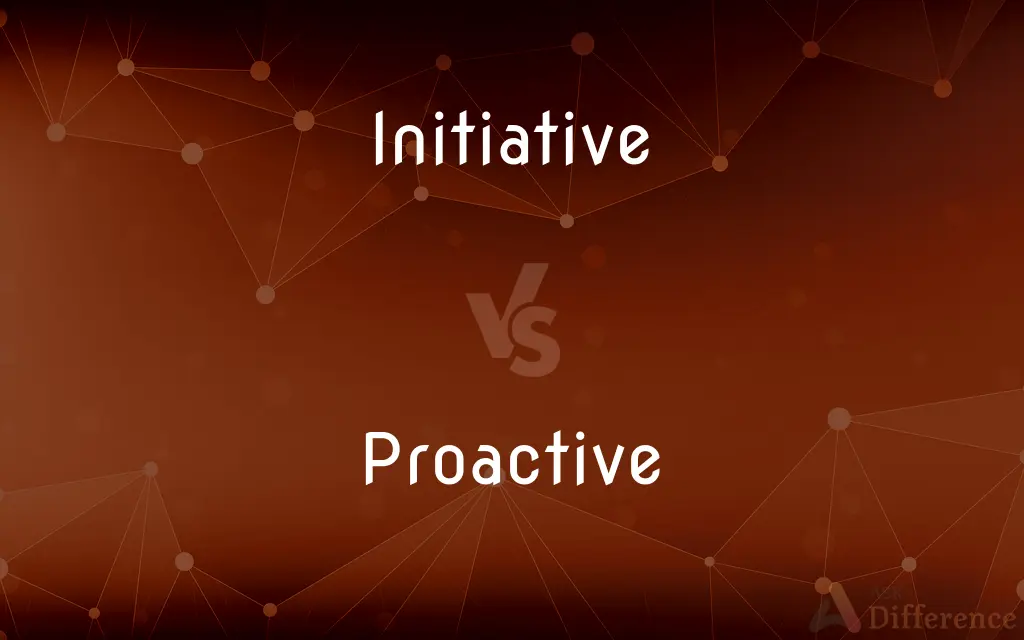Initiative vs. Proactive — What's the Difference?
Edited by Tayyaba Rehman — By Fiza Rafique — Updated on October 27, 2023
"Initiative" refers to taking the first step or action; "Proactive" describes a habit of controlling situations by causing things to happen rather than responding.

Difference Between Initiative and Proactive
Table of Contents
ADVERTISEMENT
Key Differences
Initiative implies the act of beginning something or taking the first step toward a goal, often showing leadership. On the other hand, being Proactive is an approach where one anticipates future problems, needs, or changes, and acts accordingly.
When someone demonstrates Initiative, they might be introducing a new idea or solution without being prompted. Meanwhile, a Proactive person tends to prepare in advance, aiming to mitigate potential issues or take advantage of upcoming opportunities.
In a business context, an employee might take the Initiative to lead a project or propose a new strategy. If they're Proactive, they might predict potential challenges and devise strategies to address them before they even arise.
Initiative is often a single act or decision, showcasing a person's motivation or drive in a specific moment. Conversely, being Proactive is more of an ongoing mindset, where one consistently tries to stay ahead of situations.
Initiative can be seen as the spark or trigger that begins a process or action. In contrast, a Proactive stance means consistently staying prepared and trying to foresee outcomes and reactions.
ADVERTISEMENT
Comparison Chart
Nature
An act or step taken.
An ongoing attitude or approach.
Focus
Starting or leading a task or action.
Anticipating and preparing for future events.
Context
Often relates to specific moments.
Pertains to continuous preparedness.
In Relation to Time
Present-oriented.
Future-oriented.
Grammatical Role
Noun.
Adjective.
Compare with Definitions
Initiative
An introductory act or step.
The new recycling initiative reduced waste by 50%.
Proactive
Preemptively addressing potential issues.
Proactive measures were taken to ensure the safety of the residents.
Initiative
The power or opportunity to act before others do.
The company lost the initiative when they delayed the product launch.
Proactive
Seeking to solve possible challenges ahead of time.
The proactive planning committee had backup solutions for every potential problem.
Initiative
The ability to judge and act independently.
The manager relied on Mark's initiative to handle complex clients.
Proactive
Acting in anticipation of future problems, needs, or changes.
A proactive approach to health includes regular check-ups.
Initiative
A procedure by which citizens can propose new laws.
The environmental initiative was placed on the ballot for the upcoming election.
Proactive
Controlling situations by making things happen rather than waiting to respond.
Proactive customer service often leads to higher satisfaction rates.
Initiative
In political science, an initiative (also known as a popular initiative or citizens' initiative) is a means by which a petition signed by a certain number of registered voters can force a government to choose either to enact a law or hold a public vote in the legislature in what is called indirect initiative, or under direct initiative, where the proposition is put to a plebiscite or referendum, in what is called a Popular initiated Referendum or citizen-initiated referendum. In an indirect initiative, a measure is first referred to the legislature, and then put to a popular vote only if not enacted by the legislature.
Proactive
Taking charge before others do.
Her proactive stance ensured the project stayed on track.
Initiative
The power or ability to begin or to follow through energetically with a plan or task; enterprise and determination.
Proactive
(of a person or action) creating or controlling a situation rather than just responding to it after it has happened
Employers must take a proactive approach to equal pay
Initiative
A beginning or introductory step; an opening move
Took the initiative in trying to solve the problem.
Proactive
Acting in advance to deal with an expected difficulty; anticipatory
Proactive steps to prevent terrorism.
Initiative
The power or right to introduce a new legislative measure.
Proactive
Acting in advance to deal with an expected change or difficulty
We can deal with each problem as it pops up, or we can take a proactive stance and try to prevent future problems.
Initiative
The right and procedure by which citizens can propose a law by petition and ensure its submission to the electorate.
Proactive
Descriptive of any event or stimulus or process that has an effect on events or stimuli or processes that occur subsequently;
Proactive inhibition
Proactive interference
Initiative
Of or relating to initiation.
Proactive
(of a policy or person or action) controlling a situation by causing something to happen rather than waiting to respond to it after it happens
Initiative
Used to initiate; initiatory.
Initiative
Serving to initiate; inceptive; initiatory; introductory; preliminary.
Initiative
In which voter initiatives can be brought to the ballot.
Initiative
A beginning; a first move.
Initiative
A new development; a fresh approach to something; a new way of dealing with a problem.
Initiative
The ability to act first or on one's own.
Initiative
(politics) An issue to be voted on, brought to the ballot by a sufficient number of signatures from among the voting public.
Direct initiative
Initiative
Serving to initiate; inceptive; initiatory; introductory; preliminary.
Initiative
An introductory step or movement; an act which originates or begins.
The undeveloped initiatives of good things to come.
Initiative
The right or power to introduce a new measure or course of action, as in legislation; as, the initiative in respect to revenue bills is in the House of Representatives.
Initiative
The right or procedure by which legislation may be introduced or enacted directly by the people, as in the Swiss Confederation and in many of the States of the United States; - chiefly used with the. The procedure of the initiative is essentially as follows: Upon the filing of a petition signed by a required number or percentage of qualified voters the desired measure must be submitted to a popular vote, and upon receiving the required majority (commonly a majority of those voting on the measure submitted) it becomes a law. In some States of the United States the initiative is only local; in others it is state-wide and includes the making of constitutional amendments.
Initiative
A character trait manifested in a readiness and ability to initiate action; an enterprising spirit; a go-getting attitude; energy; drive; get-up-and-go.
Initiative
In interactive activities, such as conversation or games, the right or opportunity to set the course of action; as, to have the initiative.
Initiative
Readiness to embark on bold new ventures
Initiative
The first of a series of actions;
He memorized all the important chess openings
Initiative
Serving to set in motion;
The magazine's inaugural issue
The initiative phase in the negotiations
An initiatory step toward a treaty
His first (or maiden) speech in Congress
The liner's maiden voyage
Initiative
The act of taking the first step or action.
Sarah showed great initiative by organizing the community event.
Common Curiosities
What does "Initiative" primarily indicate?
"Initiative" primarily indicates taking the first step or action, often demonstrating leadership.
Can "Initiative" relate to a specific project or plan?
Yes, "Initiative" can refer to a specific project, plan, or action introduced or begun by an individual or group.
Is every act of "Initiative" proactive in nature?
Not necessarily. One can take the "Initiative" without foreseeing future outcomes, just as one might be proactive without starting a new action.
What does it mean to be "Proactive"?
Being "Proactive" means anticipating and acting on future problems, needs, or changes instead of merely reacting.
Can someone be both "Proactive" and show "Initiative"?
Yes, one can be proactive in their approach and also take the initiative to begin actions or projects.
Is "Proactive" always about addressing negative situations?
No, being "Proactive" can also mean seizing potential opportunities, not just mitigating negative situations.
Is being "Proactive" about preventing problems?
Partially. Being "Proactive" is about anticipating problems and acting in advance, which may include prevention or capitalizing on opportunities.
Can "Initiative" refer to a law or policy proposal?
Yes, particularly in certain governance structures, "Initiative" can refer to a procedure where citizens propose new laws or policies.
How do "Initiative" and "Proactive" differ in terms of time?
"Initiative" is often present-oriented, while "Proactive" is future-oriented.
Does "Proactive" always lead to positive outcomes?
No, while being proactive can help anticipate and mitigate challenges, it doesn't guarantee positive outcomes.
Can "Proactive" apply to both individuals and groups?
Yes, both individuals and groups can adopt a "Proactive" approach.
What's a simple synonym for "Initiative"?
A simple synonym for "Initiative" could be "enterprise" or "drive".
Are "Initiative" and "Proactive" interchangeable terms?
No, while they both involve forward-thinking and action, they have distinct nuances and aren't always interchangeable.
Can companies or organizations show "Initiative"?
Absolutely. Companies can show "Initiative" by introducing new products, strategies, or solutions.
Is being "Proactive" similar to being prepared?
While they're related, being "Proactive" goes beyond preparation by actively trying to influence future events or outcomes.
Share Your Discovery

Previous Comparison
Meltdown vs. Breakdown
Next Comparison
Clan vs. KindredAuthor Spotlight
Written by
Fiza RafiqueFiza Rafique is a skilled content writer at AskDifference.com, where she meticulously refines and enhances written pieces. Drawing from her vast editorial expertise, Fiza ensures clarity, accuracy, and precision in every article. Passionate about language, she continually seeks to elevate the quality of content for readers worldwide.
Edited by
Tayyaba RehmanTayyaba Rehman is a distinguished writer, currently serving as a primary contributor to askdifference.com. As a researcher in semantics and etymology, Tayyaba's passion for the complexity of languages and their distinctions has found a perfect home on the platform. Tayyaba delves into the intricacies of language, distinguishing between commonly confused words and phrases, thereby providing clarity for readers worldwide.













































